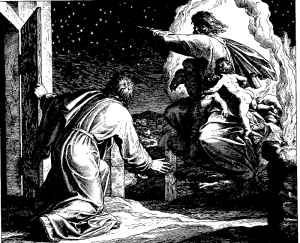Let me tell you about a wonderful person I know. He never knew God until he was about 25, when he came to faith. He started coming to church and had an experience of God’s love and power! And so he came to love God, and was growing spiritually! But then came a point when he no longer felt God’s presence. So, we talked about what was going on, but things didn’t improve. We talked about it again the next year. Then we tried something else the year after. I have been listening and encouraging him for years, and nothing’s getting better.
[Listen to Fr. Justin’s homily here.]
Brothers and sisters, dear guests, this pattern happens to many of us. Some of us describe it this way: “I feel dry. I’m in a state of spiritual desolation. I can’t feel God’s presence anymore.” We used to go to Mass all the time and be involved, but not anymore. What’s going on? Why don’t we feel close to God any longer? Now usually what we do is we wait for something to happen; we expect God to bring us closer to Him again, but that rarely happens.
 Here’s the solution. The First Reading says, “The Lord said to Abram, ‘Look toward heaven and count the stars, if you are able to count them.’ Then he said to him, ‘So shall your descendants be.’ And he believed the Lord; and the Lord reckoned it to him as righteousness” (Gen 15:5-6). In the ancient Near East, to be without children was a “family’s greatest misfortune,” and Abram was 78 at this point! God now promises Him children as numerous as the stars, but here’s the thing: When Abram looked up to the sky, it was daytime! How do we know? Because it says later in the reading, “As the sun was going down… When the sun had gone down and it was dark” (Gen 15:12,17). The point is: The stars are there, but he couldn’t see them! God made a promise, but Abram couldn’t see the promise, and yet he still believed God and committed his heart to Him.
Here’s the solution. The First Reading says, “The Lord said to Abram, ‘Look toward heaven and count the stars, if you are able to count them.’ Then he said to him, ‘So shall your descendants be.’ And he believed the Lord; and the Lord reckoned it to him as righteousness” (Gen 15:5-6). In the ancient Near East, to be without children was a “family’s greatest misfortune,” and Abram was 78 at this point! God now promises Him children as numerous as the stars, but here’s the thing: When Abram looked up to the sky, it was daytime! How do we know? Because it says later in the reading, “As the sun was going down… When the sun had gone down and it was dark” (Gen 15:12,17). The point is: The stars are there, but he couldn’t see them! God made a promise, but Abram couldn’t see the promise, and yet he still believed God and committed his heart to Him.
The solution to our feeling far away from God is not to wait for something to happen, for God to bring back the feelings. The solution is to make a deeper commitment to God when we can’t feel Him!
We’ve talked about this before. It’s the difference between knowing that God is there and feeling He’s there. A year and a half ago I shared with you a story that surprised some of you. It was about Sagi Kalev, a body builder, who had to join the Israeli military at 18, because it was mandatory. After the first three days, before being assigned, he called his mom, “crying like a little boy,” and what did she do? She hung up on him. He called her back: “I think the phone got disconnected.” She said, “Nope, I hung up the phone. It’s time for you to grow up.” Now Sagi’s the one who tells this story, and there’s no bitterness in him! His mother knew he could rely on her love, but he couldn’t rely on always calling her whenever he was afraid. Her love was there, and he had to live by the knowledge of this, not by the feelings.
The reason my friend is far away from God is because he’s not totally committed to God. How do I know? Because he told me he’s not faithful to daily prayer, and skips church when he thinks he needs to. He thinks God is far away, but that’s not true. Just like the stars in the sky during the daytime—are they there? Yes. The truth is: My friend’s heart is far from God.
Now, someone challenged me again, saying, “Fr. Justin, you’re holding back again.” Remember, at the beginning of February, we talked about self-censorship? So, thank you for the challenge, and keep it coming. Let me speak more candidly. My friend, whom I love and who has many virtues, isn’t even doing the minimum: daily prayer and Sunday Mass are the minimum for someone who chooses to follow Christ. To be totally committed to Christ means to give Him our heart and actions: We’ll say, “I love You. I will never leave You no matter what.” It means we’ll spend more than the minimum amount of time in prayer; we’ll spend dedicated time with Him every day; we’ll study our faith, we’ll give sacrificially; we’ll practice works of mercy; we’ll enthusiastically share our faith!
 (By the way, I want to thank everyone who participated in our 40 Days for Life campaign. We had 307 people witness to the truth and stand up for the vulnerable! Good for you! Praise God! That’s amazing! I’m in awe! Next year on Ash Wednesday, think about being a witness again!)
(By the way, I want to thank everyone who participated in our 40 Days for Life campaign. We had 307 people witness to the truth and stand up for the vulnerable! Good for you! Praise God! That’s amazing! I’m in awe! Next year on Ash Wednesday, think about being a witness again!)
Now, my friend doesn’t believe my explanation. He wants to believe there’s another reason; it’s human nature to always choose the explanation that shifts responsibility from us and onto another person.
There’s a good priest I know who, when I asked, “How are you, Father?” “Well, I’m in a crisis. But Fr. Steve says I’m always in a crisis.” Then I thought: Fr. Steve’s right. This priest is always in a crisis. The problem’s not out there! The problem is in here, in the heart, with our commitment.
 Many married couples often wonder what happened to their love after the wedding. They used to love each other so much but now the feelings are gone, and it’s not the kids’ fault. And so they try to recreate those feelings but nothing works. The reality is: When we focus on the feelings, they never come back. But, in most pretty healthy marriages, when we say, “I’m going to love my spouse even when I get nothing back or don’t feel anything. I’m going to commit,” the feelings return.
Many married couples often wonder what happened to their love after the wedding. They used to love each other so much but now the feelings are gone, and it’s not the kids’ fault. And so they try to recreate those feelings but nothing works. The reality is: When we focus on the feelings, they never come back. But, in most pretty healthy marriages, when we say, “I’m going to love my spouse even when I get nothing back or don’t feel anything. I’m going to commit,” the feelings return.
What takes more love: Parents’ loving children who are ungrateful and lazy, or loving children who are sweet and adorable like me? What shows more love: To come to Mass when we feel close to God or to come to Mass when we don’t? You see, we feel distant from God because we don’t love Him enough. We’ve been taught our whole lives to love when it feels good. But that’s not the way of Christ! Christ loves even when it hurts and proves it. Pope Benedict says, “It is part of love’s growth… that it… seeks to become definitive” (Deus Caritas Est, 6,2).
When we’re in desolation, God doesn’t always come and rescue us, because He’s waiting for us to become more like Him, that is, committed! I still pray that my friend comes to know this.
Back to the First Reading: God then promises Abram some land, “but Abram said, ‘O Lord God, how am I to know that I shall possess it?’ The Lord said to him, ‘Bring me a heifer three years old, a female goat three years old, a ram three years old, a turtledove, and a young pigeon.’ He brought him all these and cut them in two, laying each half over against the other… And when birds of prey came down on the carcasses, Abram drove them away… When the sun had gone down and it was dark, a smoking fire pot and a flaming torch passed between these pieces” (Gen 15:8-11,17).
The meaning of this passage is the following: “The animals… are ‘clean’ animals… suitable for sacrifice… according to biblical law… The smoking fire pot and torch… are representations of God’s presence…meant, in the ancient Near East: whoever passed through the pieces was saying… ‘May I be slain like these animals if I do not keep the commitments of the covenant I am now making…’ God was saying to Abraham: ‘I invoke upon myself a curse of death if I do not fulfill the promises I am making to you right now.’” This is a sign of God’s commitment. When things get difficult, God shows us commitment, which is a sign of love.
Many people tell me, “Father, I’m dry. I’m in desolation. I feel distant from God.” They’re always in desolation, but I rarely am. Now ask me why I’m rarely in desolation, go ahead, ask! There are two reasons:
1) I experience desolation, but I address it and am not preoccupied with it. I’m not preoccupied with my feelings. I’ve been trained to be aware of my feelings, because they help me a lot and tell me many good things, but sometimes they confuse me, and so I’ve been trained not to act always on them. When I feel desolate, I don’t panic or stop praying. I do what I’m telling all of you to do: Love God more.
I told a seminarian recently that when we’re in a crisis, we need to respond using both spiritual and human means, that is, focus more on commitment, unite yourself to Jesus’ Cross, talk to a spiritual friend about it but afterwards, go out for some ice cream. Ice cream can really help. What flavour do you like? You see, you’re feeling closer to God already.
2) I learned early on in my spiritual journey that disappointment always comes in life—always, always, always. People letting us down, bad things happening to us is normal, and during those times we will prove our love for God.
When I was 16, right after my conversion and feeling loved by God, I was horribly disappointed with my new Catholic friends. But I was taught that this kind of thing would happen, and so I made a choice, while I was on the phone with my friend, not to leave God.
When I was 19 and pondering my decision to become a priest, I was sitting at my desk in my room at the seminary. I knew God was calling me and I couldn’t shake it. I tried to get out of it, but I realized that God had called me to be a priest, to be His own. At that moment, I didn’t choose it because it felt good; it really hurt. All my own dreams of getting married, having fun with friends, doing what I wanted were gone. I made that choice because God loved me and I loved Him. And I said to Him, “Alright, I will be a priest even if I’m miserable for the rest of my life… because I love You.” That was a promise. And I shut the door forever on marriage. Because of the grace of that commitment, I think I’ve been protected from all sorts of desolations. And I’m not at all miserable! I honestly never knew I could be this happy! I was recently with a university student who was shadowing me in some of my ministry in order to learn more about the priesthood. It was such a joy to share with him what I was thinking during the ministry: I get to spend my whole day being with God and serving Him alone; I get to spend hours with Him every day; and I get to love people and enter their lives in ways that most people never experience.
I’m not saying people who are miserable in their lives should ignore this, because God wants us to experience joy; I only say this to illustrate that I was willing to give up joy for the sake of love, the way Jesus gave it up for us.
The First Reading finishes by saying, “On that day the Lord made a covenant with Abram, saying, ‘To your descendants I give this land, from the river of Egypt to the great river, the river Euphrates” (Gen 15:18). As we’ve discussed a few times now, covenant means building a family, as when a man and a woman get married or when we adopt children, or when God brings us into His family.
God’s always leading us toward a covenant. He doesn’t want to force us to love Him, but wants to win our hearts so that we commit ourselves to Him the way He already does to us.
I want to remind you how much God loves you. I think all of us have experienced God’s hand in our lives. We’ve felt loved, we’ve seen miracles in our lives, we have so much for which to be grateful. You are good, God loves you, and I love you.
 One thing we need to do better as a parish is invite people to make that commitment to God, or renew it, or increase it. What I suggest today is that we all make or renew our commitment in proportion to how much we love God. Here’s the secret: We can still make the commitment even if we don’t feel like it—in fact, that’s the greatest commitment! If we’ve been on the fence in terms of our faith, let’s get off and choose God’s side. At any point today during the Mass, when we feel ready, we can use a simple prayer from Catholic Christian Outreach’s The Ultimate Relationship or one from the Marian consecration or use our own words.
One thing we need to do better as a parish is invite people to make that commitment to God, or renew it, or increase it. What I suggest today is that we all make or renew our commitment in proportion to how much we love God. Here’s the secret: We can still make the commitment even if we don’t feel like it—in fact, that’s the greatest commitment! If we’ve been on the fence in terms of our faith, let’s get off and choose God’s side. At any point today during the Mass, when we feel ready, we can use a simple prayer from Catholic Christian Outreach’s The Ultimate Relationship or one from the Marian consecration or use our own words.
If we can say something like, “Jesus, I’ll never leave you, no matter what. It doesn’t matter what happens, I will always love You,” then we will always be close to God and be protected from all sorts of desolations.
In the great novel, The Lord of the Rings, which the author J.R.R. Tolkien said “is of course a fundamentally religious and Catholic work,” the main character is Frodo, a Christ-like figure who has to carry the ring into the heart of evil in order to destroy it. The ring represents what? Sin. Christ has to destroy sin. And Frodo is accompanied by his faithful friend, Sam. I never understood Sam until my brothers explained to me that Sam is the model of loyalty.
Here’s a clip from the end of the first film, where Frodo has been betrayed and realizes that he has to carry the ring himself; he doesn’t want to but that’s his vocation. However, Sam won’t leave him, no matter what, even if it means he’ll die. The point of today’s homily is what Sam says: “I made a promise.” That’s what God says to us, and what we’re invited to say to Him.
